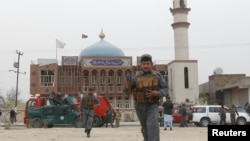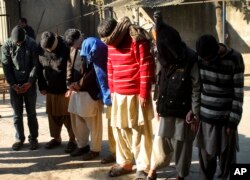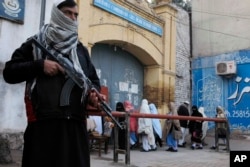Monday's suicide bombing of a Shiite mosque in Kabul is yet another indicator of Islamic State's expanding terror activities in parts of the Afghanistan-Pakistan region, government officials and analysts say.
IS, which claimed responsibility for the bombing, is expanding its presence in several districts of Afghanistan, including eastern Nangarhar province, which borders Pakistan, officials say. And in Pakistan, authorities say recent arrests of IS members in several parts of Pakistan show the group is establishing a foothold in that country.
With IS under siege from a coalition of forces in Iraq and Syria, the terrorist group is looking for safer havens elsewhere, experts say.
“As IS has found itself increasingly on the defensive in the Middle East, it seems to be looking for new areas to carve out a presence," said Michael Kugleman, an analyst at the Wilson Center, a global policy research group. “The Afghanistan-Pakistan region, where it already has a light footprint, appears to be one of the targets.”
By targeting Shiite minority members in Afghanistan, IS is trying to create divisions between Shiites and the Sunni majority in Afghanistan, analysts say.
Mosques now military training centers
Last month, IS gunmen stormed Kabul's Kart-e Sakhi shrine and opened fire on Shiite mourners, killing 19 of them.
IS has killed dozens of religious scholars it deems as the enemy or repugnant to its extremist brand of Islam, local Afghan officials told VOA. IS has been reported using mosques as military centers.
“IS has turned at least 60 mosques in five districts of Nangarhar into military training centers,” Abdul Zahir Haqqani, director of religious affairs in Nangarhar, told VOA's Afghan service. The imams have fled to Jalalabad, Nangarhar's capital city, Haqqani added.
IS also has launched multiple attacks on Afghan police checkposts and villages in recent months, it has imposed taxes on agriculture activities in areas it controls, and it has been cutting down trees in some parts of the province in a timber-smuggling operation to neighboring Pakistan.
The governor of southern Zabul province said IS is getting stronger and, in some areas, has taken over rival Taliban positions.
“In some areas white flags [Taliban’s] have been replaced by black flags [IS’s] … this is a major threat and we have shared our concerns with the central government," Zabul governor Bismillah Afghanmal told Radio Liberty.
According to the head of the provincial council in Zabul, IS has established military bases in at least four districts of the province.
Islamic State expands recruiting
Officials in central Ghazni province, which borders Zabul, told VOA that IS has been recruiting in three districts.
“The situation in these areas is worrisome … fighters from Uzbekistan have settled along with their families in some remote mountainous areas and have been trying to recruit locals into their ranks," Khaleqdad Akbari, head of the provincial council in Ghazni, told VOA.
IS launched its operation in the AF-Pak region in early 2015 after establishing bases in remote eastern border areas of Afghanistan. The group calls Afghanistan, Pakistan and parts of Iran its so-called Islamic State of Khorasan Province, and allegedly takes orders from leaders in Syria.
Pakistani officials say that they have arrested hundreds of IS operatives from different cities within the past two years, but they insist the Middle Eastern group has no organized presence in Pakistan.
Eight militants captured
Authorities in Pakistan last week said they captured a group of eight militants in Lahore, operating at the behest of IS. An IS militant was killed last week during a police raid in Murree city, near Islamabad. And IS claimed responsibility for an attack on a shrine in Baluchistan province this month that killed more than 50 people.
According to a Pakistani newspaper, The News, at least 14 Pakistanis traveled last month to Syria to join IS.
Former interior minister, Senator Rahman Malik, told VOA that IS has been present in Pakistan since 2014 and has been increasing as a terrorist force.
They have gained the "ability" to strike targets, he said.







